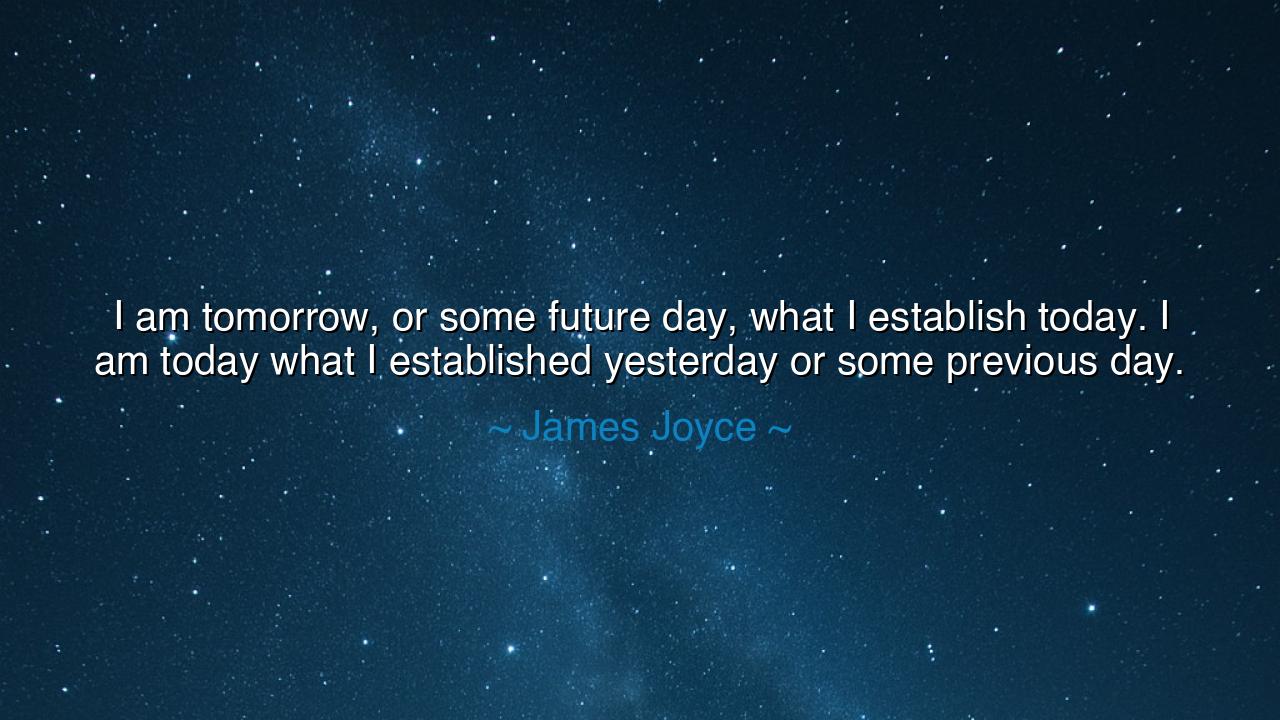
I am tomorrow, or some future day, what I establish today. I am
I am tomorrow, or some future day, what I establish today. I am today what I established yesterday or some previous day.






"I am tomorrow, or some future day, what I establish today. I am today what I established yesterday or some previous day." These profound words by James Joyce speak to the eternal truth of self-creation and the power of the present moment in shaping our future. In his statement, Joyce encapsulates the idea that who we are tomorrow is not determined by fate, but by the decisions and actions we make today. The future is not some distant realm that arrives on its own—it is woven from the fabric of our present. Similarly, the present moment is the consequence of the choices we made in the past. There is no separation between who we are now and who we have been; time is fluid, and the actions of each day carry a weight that stretches across the continuum of our existence.
In the ancient world, time was understood as a sacred and unyielding force, yet it was also seen as something to be honored and respected. The Greeks revered the concept of kairos—the right moment to act, the critical time in which decisions would echo through history. In their minds, the choices we made in the present moment were not merely transient, but had the power to reshape the future. To live without awareness of time, to fail to act with purpose and intent, was to live a life bound to the tyranny of fate, disconnected from the greater flow of destiny. Joyce’s words align with this ancient understanding, reminding us that what we create today is the foundation upon which the future will be built.
Consider the life of Alexander the Great, who forged an empire that stretched from Greece to India. Alexander’s future—his conquests, his legacy—was not determined by some mystical force, but by the choices he made in every moment. His ambition to conquer, to expand, was rooted in his decisions today. Each step he took, each battle he fought, created the path for the empire he would one day rule. And yet, Alexander’s empire, as vast as it was, ultimately crumbled, because the actions he took in his youth—his relentless pursuit of power and conquest—were not balanced with wisdom and reflection. Joyce’s words are a reminder that our choices today, while powerful, must be shaped by wisdom, for they will shape the future in ways we may not fully foresee.
James Joyce himself, through his groundbreaking work, offers a perfect illustration of this idea. His masterpiece, Ulysses, is a detailed, almost obsessive examination of a single day—the choices, actions, and reflections of a man living through just one day of his life. In the novel, Joyce demonstrates that every thought, every action, no matter how small, contributes to the creation of who we are, both in the present and in the future. The characters in the novel, and indeed the very structure of the book, reflect the complexity of Joyce’s idea: that the present moment is both the consequence of the past and the seed of what is yet to come. Through this exploration, Joyce teaches us that time is not linear, but circular, each moment feeding into the next, and shaping the future in ways both subtle and profound.
The lesson of Joyce’s wisdom extends beyond the realm of literature and into the very fabric of our daily lives. If we wish to create a future of meaning, we must recognize the power of the present moment. Every action we take today is the foundation of tomorrow. If we squander the present in self-pity or complacency, we may find that we are the victims of our own inaction, unable to escape the constraints of our past mistakes. But if we choose to act with purpose, if we invest in the present by cultivating virtue, wisdom, and integrity, then we can be the masters of our future. It is not the passive passage of time that shapes us, but our active engagement with it.
Consider the life of Nelson Mandela, whose legacy as a leader of peace and justice was not a gift bestowed by fate, but a result of every decision he made over the course of his life. His choices, beginning with his early resistance to apartheid, were steps in the journey that would lead him to become the first black president of South Africa. Every action, every protest, every moment of suffering in prison, was part of the future he created for his people. Mandela understood that today shapes tomorrow, and in his commitment to justice and peace, he transformed not just his own destiny, but the destiny of a nation.
In your own life, take these lessons to heart. Your present actions hold the key to the future you seek. Reflect on your choices each day, understanding that every decision—no matter how small—shapes your future. Do not let the fear of the unknown hold you back, for the future is not a distant place that will one day arrive unbidden. It is something you are creating with every step you take. Choose to create a future of purpose, integrity, and wisdom. As Joyce reminds us, you are today what you established yesterday, and you are tomorrow what you establish today. The future is yours to shape, and it begins in the choices you make in this very moment.






AAdministratorAdministrator
Welcome, honored guests. Please leave a comment, we will respond soon